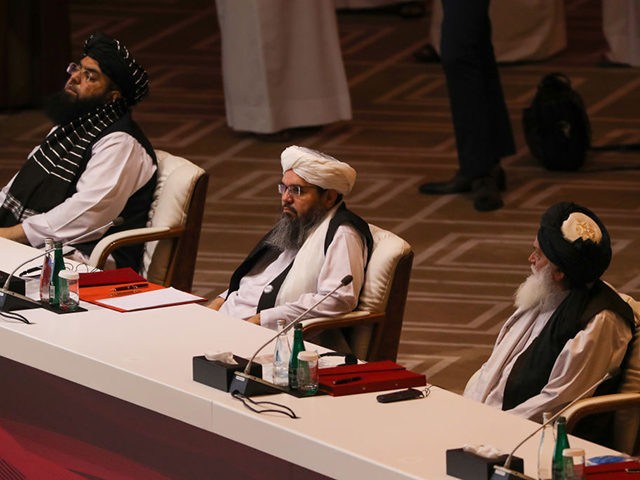A spokesman for the Pentagon said Thursday that the Taliban was jeopardizing the peace process with the United States by failing to live up to its promise to cut ties with terrorist groups like al-Qaeda and cease its attacks on Afghan forces.
American officials began a new round of talks with the Taliban in Doha, Qatar, in September that resulted in an agreement Trump administration officials hoped would help result in a final exit of American troops from Afghanistan. The top concerns of American negotiators were to convince the Taliban to stop cooperating with terrorist groups that seek to kill Americans, like al-Qaeda, and to encourage Taliban officials to use political means, and not attacking U.S. troops, to amass political power.
The Taliban demanded an end to the Afghan government — the Taliban considers itself the only legitimate government of Afghanistan — and the imposition of a Sunni jihadist caliphate in Afghanistan. Afghanistan is already an Islamic republic, governed in part by sharia, or Islamic law.
While American officials did not agree to that demand, the Taliban did succeed in getting the Afghan government to agree to free hundreds of Taliban jihadis from prison, moving the talks forward. Afghanistan documented a dramatic decline in civilian casualties in 2020, according to the United Nations, in part fueled by diminished Taliban attacks on Americans and civilians, and increased attacks on Afghan security forces.
American forces were scheduled to depart Afghanistan completely by May 2021 in the event that the Taliban followed through on its promises.
The Pentagon’s warning that the Taliban have, in addition to continuing to attack Afghan forces, also maintained ties to terrorist groups like al-Qaeda could fray the already delicate diplomatic situation.
“We are still involved in trying to get a negotiated settlement. The Taliban have not met their commitments,” John Kirby, a spokesman for the Pentagon, said Thursday, according to Afghanistan’s Khaama News. “Without them meeting their commitments to renounce terrorism and to stop the violent attacks on the Afghan national security forces, and by dint of that the Afghan people, it’s very hard to see a specific way forward for the negotiated settlement.”
Kirby added that, without a clear indication that the Taliban were enacting their commitments in the deal in good faith, the Pentagon could not guarantee a full American troop withdrawal by May.
“What I’m saying is that any decision of force levels in Afghanistan is going to be driven by our security requirements, there are security commitments there, and driven by conditions,” he emphasized. “No decision has been made on future force posture.”
The U.S. Treasury Department, which engages in activities to limit terrorist financing, warned similarly in its January report that it had evidence indicating that al-Qaeda was increasing its financial foothold in Afghanistan, thanks in part to help from the Taliban.
Al-Qaeda, the Treasury report said, was enriching itself in the country “through its network of mentors and advisers who are embedded with the Taliban, providing advice, guidance, and financial support.” The report explicitly accused the Taliban of offering al-Qaeda “protection” in direct contradiction to peace deal commitments.
“As of May 2020, the Taliban and al-Qaeda maintained a strong relationship and continued to meet regularly,” the report said.
Taliban spokesmen have complained since at least October that the American government was allegedly not holding up its end of the deal because of continued airstrikes on terrorist targets.
“In recent days, the United States forces conducted day-and-night airstrikes in Nahri Saraj, Khoshkawa, Babaji of Helmand province, including areas in Gereshk, Sangin, Nawa, and Nad Ali districts,” Taliban spokesman Muhammad Yousuf Ahmadi said at the time. “Also [airstrikes] in Farah and other provinces, which is a clear violation of the Doha agreement.”
Similarly, Taliban representatives protested Friday that they had fulfilled their end of the deal but that, in allowing the legitimate government of Afghanistan to continue to exist, Washington was harming its relations with the jihadist organization.
“Ashraf Ghani’s administration is the only hurdle for peace,” Taliban negotiator Sher Mohammad Abbas Stanekzai said on Friday from Moscow, referring to the president of Afghanistan. “One of their insincerity [sic] is that their (Afghan Republic’s negotiating) team has not been given full authority for talks.”
Stanekzai was in Moscow, he said, to pressure Russia and other neighboring countries to help convince the administration of President Joe Biden to withdraw from Afghanistan.
“These countries are very close to us, they are our neighbors, they are involved in Afghan matters. That’s why we’re talking to them, we share their concern and we seek their support for the peace process in Afghanistan,” Stanekzai responded when asked about his tour.
“We hope that Americans should go according to this peace treaty which was signed in Doha. It’s a good chance for Americans … it is in their favor,” he argued.
Voice of America quoted Stanekzai as noting that the Taliban were giving the American troops an unprecedented chance in the history of the ancient country and vehemently denying reports alleging that the Russian government had offered the Taliban bounties for killing Americans.
“We do not need anyone to give us reward for the killing of Americans. Americans are the invaders and we are [have been] killing them since 2001,” he asserted. “If they remain in Afghanistan after this [the agreed deadline] we will also kill them even if somebody reward us or do not reward us. We take our reward from God. We fight the invaders without a reward, without any bounty.”

COMMENTS
Please let us know if you're having issues with commenting.